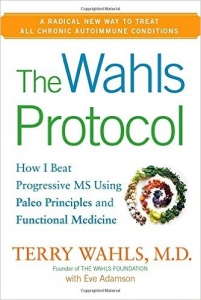Book Excerpt: How I Beat Progressive MS Using Paleo Principles and Functional Medicine
 Title: The Wahls Protocol: How I Beat Progressive MS Using Paleo Principles and Functional Medicine
Title: The Wahls Protocol: How I Beat Progressive MS Using Paleo Principles and Functional Medicine
Author: Terry Wahls, MD
Publisher: Avery; First Edition edition (March 13, 2014)
Ordering information: Amazon | Target
You are made of cells. A cell is a unit that makes up a living organism. Some organisms consist of only one cell, like an amoeba. Some, like human cells,
Cells, however, don't work under just any conditions. They need certain nutrients in order to do the work of keeping you alive and healthy. Without those nutrients, the cells begin to malfunction, even die. Where do those nutrients come from? They come from the food you eat—nowhere else. If you aren't providing the right nutrients and environment for your cells, then they won't work as well as they could, and a malfunction at the cellular level could eventually impact any aspect of your health. Your genetics may determine what goes wrong, but when the cells aren't getting what they need, the body
People often wonder whether health is mostly a matter of genetics. Do
Living in Iowa, we hear a lot about corn and see a lot of corn, and so I use this as an example reflecting my Midwestern roots—an example of how important fuel is for your mitochondria and, by extension, your cells, your organs, and your entire body, including your brain. A packet of seeds can all contain the same DNA, but if you plant a handful of corn seeds in rich black Iowa soil and you toss another handful onto a toxic trash heap topped with a thin layer of dirt, the seeds will grow into
Don’t miss the opportunity to hear Terry Wahls speak at the Integrative Healthcare Symposium Annual Conference February 23-25, 2017 in New York City. Click here for more information.




















SHARE